Developer Dotemu has been on a generational run the past few years. Known predominately for its beat-em-up titles, the Paris-based studio (and subsidiary of Focus Entertainment) is an expert in making old-school experiences feel brand-new.
In 2020, Dotemu helmed the terrific Streets of Rage 4, which married gorgeous art with velvet-smooth gameplay to great effect. In 2022, the studio followed up with Teenage Mutant Ninja Turtles: Shredder’s Revenge, an impressive callback to Saturday evenings dropping quarters at the arcade. Add another stellar brawler in Ninja Gaiden: Ragebound, which released just a few short months ago, and it’s clear Dotemu has a winning formula on its hands.
Not content with publishing just one banger in 2025, Dotemu is back — this time with an original IP that has many fans and critics abuzz. Absolum takes what worked with prior Dotemu titles (satisfying combat, cool combos, stylish visuals) but otherwise breaks from the retro formula. With an emphasis on high-fantasy storytelling and roguelike gameplay, Absolum is the mashup of Hades and Streets of Rage I never knew I needed.
Exciting as that prospect may be, Absolum isn’t quite a homerun smash. Its roguelike structure isn’t nearly fleshed out to support endless hours of play, and there are bizarre balancing issues that could have been ironed out with a player beta or early access phase. Still, the combat is sublime, and I had a hard time putting Absolum down — a sign it might just be a bop.
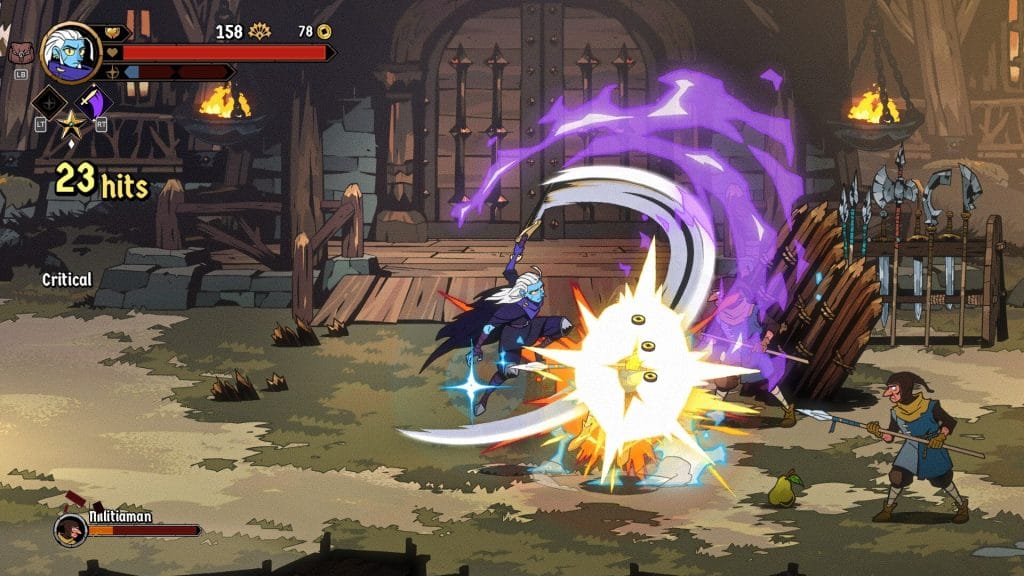
You’re a Wizard, Brome
Absolum takes place in the land of Talamnh — a stark departure from the typical fictional worlds Dotemu is known for. Gone are the Earth-inspired cityscapes, replaced instead by medieval drawbridges, barracks, and castles. Guns and shurikens, likewise, have faded in favor of bows, arrows, and magic incantations. With Absolum, the streets are out and high fantasy is in.
It’s a welcome change, carried in large part by its four playable protagonists. Galandra is a swordswoman who packs a big swing and impressive power. Karl is a dwarf specializing in close-range combat, while the wizard Brome is a midrange fighter capable of area-of-effect magic. The quick-witted and even quicker-hitting Cider rounds out the cast.
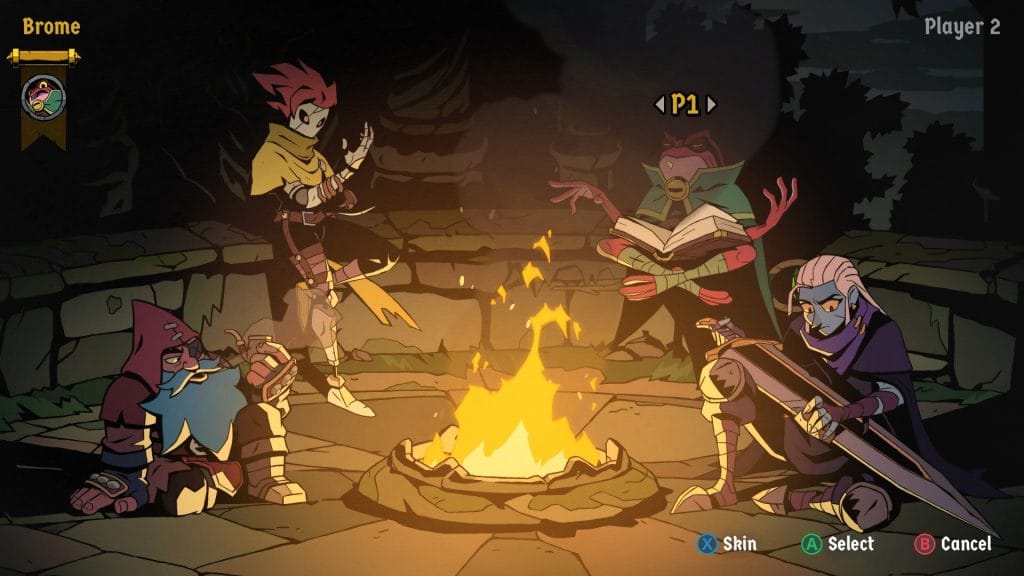
Despite their very different personalities, these characters share much of the same base kit. With one button, you’ll unleash a quick light combo; with another, you’ll perform a heavy attack that can stagger enemy attacks and repel incoming projectiles. You’ve also got a jump, a dash, and a grab — all staples of any great Dotemu brawler.
Similar to Streets of Rage 4 or Shredder’s Revenge, you’ll bob and weave through various waves of enemies (soldiers, goblins, and ghosts, among many others) as you progress ever further to the right. Your goal in Absolum: Find and defeat the evil Sun King, Azra, who has taken control of the land and now rules over it with an iron fist.
The story itself is nothing to write home about. Though well-acted and admirably written, Absolum’s tale is a slow dripfeed of lore and motivations that works best as set-dressing for the action at hand. I found myself entertained by the quest to free Talamnh, but never felt as engaged with the heroes’ plight as I did, say, Axel’s in SoR4 or Zagreus’s in Supergiant’s Hades.
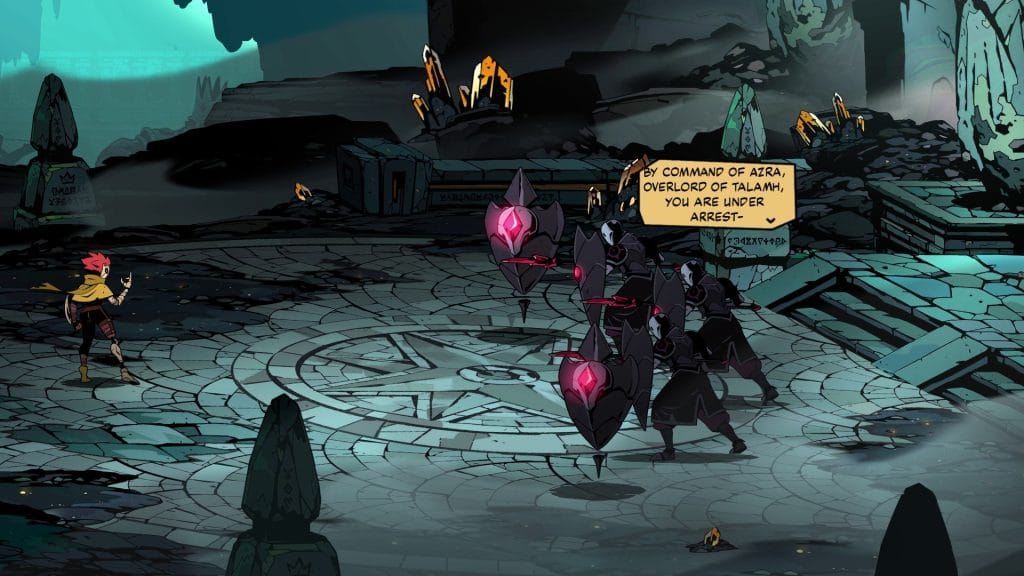
We’re Off To See the Sun King
The aforementioned Hades might seem like an odd comparison for Absolum. One’s a top-down dungeon crawler in the vein of Diablo; the other’s a side-scroller you’d expect to find between a pair of pinball machines. Yet, the two have far more in common than you’d think.
The easiest parallel is the game’s roguelike structure. Just like in Hades, the world is divided into four zones, each with branching paths to walk, upgrades to find, enemies to battle, and secrets to discover. The farther you progress through the world, the closer you get to the big baddie at the end — either Hades or Azra — and the harder each new enemy hits. Eventually, you’ll fall in battle, bringing you back to a hub world to decompress, chat with NPCs, unlock new permanent upgrades, then spring back into battle.
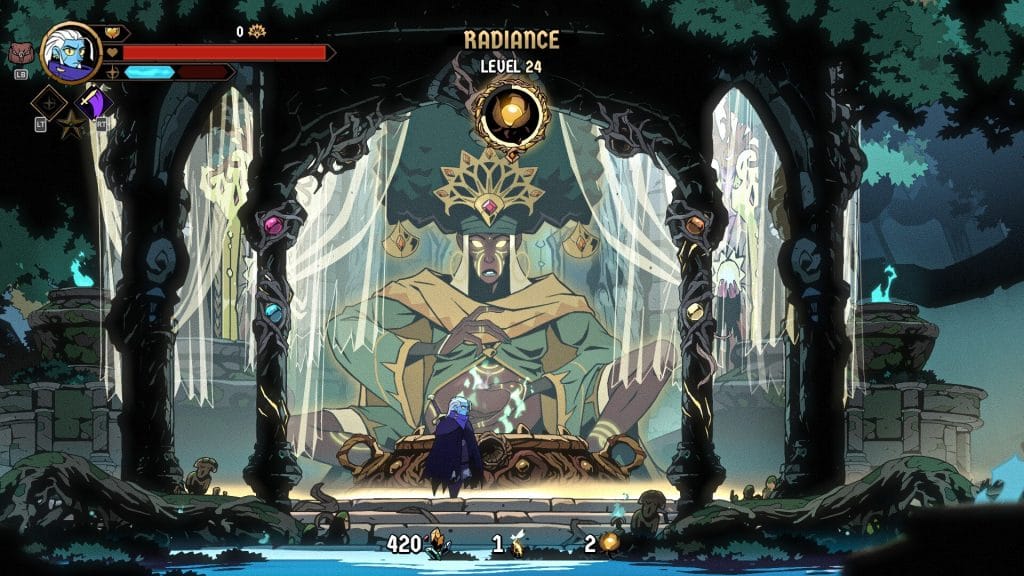
Where Hades had Zagreus gaining power during each run through the blessings of various (very hot) Greek gods and goddesses, Absolum grants new perks with little fanfare. Every few rooms, you’ll find a gem containing one of two (or three, upon a later upgrade) abilities that build on your base kit. Each power involves a different element: One perk creates a trail of fire whenever you dash, while another spawns tidal waves after a successful dodge. There’s an impressive number of abilities and a near-dizzying array of permutations to experiment with.
It’s a lot to digest at first. Initial runs through Talamnh involve plotting a course through foreign lands, learning enemy attack patterns, and slowly acclimating to the different builds available to your heroes. Much like Hades, though, you’ll soon find a groove. Especially in the early hours of Absolum, I had a blast learning the game’s various secrets, whether that be a secret boss encounter or the location of a tantalizing side quest.
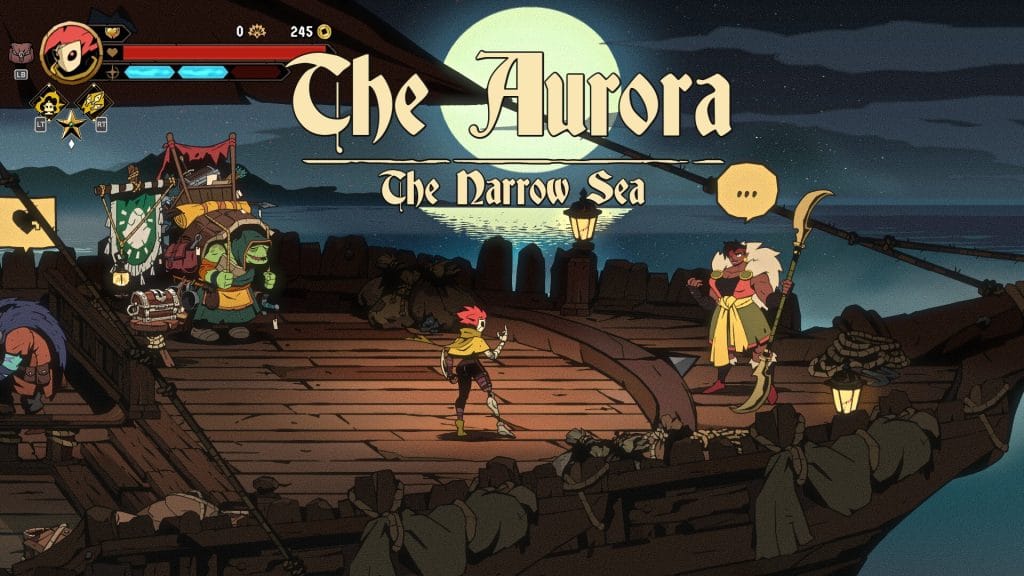
Trials and Tribulations
Unfortunately, Absolum’s variable structure is also its biggest undoing. About five hours in, I defeated Azra for the first time, after which — in typical roguelike fashion — the “real” game began. I was tasked with repeating my run for an even greater challenge, complete with remixed enemies, new dialogue and secrets, and a post-Azra superboss.
That may sound like a good time; who doesn’t like a little longevity with their games? With Absolum, however, the more you play, the more you start to see cracks in the armor. Unlike Hades, where each run feels like a test of skill, Absolum relies more on endurance and, dare I say it, blind luck. Did the merc on the pirate ship stand guard in front of the captain’s quarters? You just missed out on an opportunity to steal some gold and buy new items. Did that portal in the tavern disappear? Guess you’re not using your trusty little shortcut.
Variance is a given in roguelikes, but in Absolum, it feels less like design intent and more like true randomness. After about 20 runs, I ended up sticking to the same linear path through the world — it provided some stability, and it’s not like there were any advantages to picking a different path. Contrast this with Hades, where players can preview which perk lies beyond which door, and I couldn’t shake the feeling I was playing a pale imitation of the real McCoy.
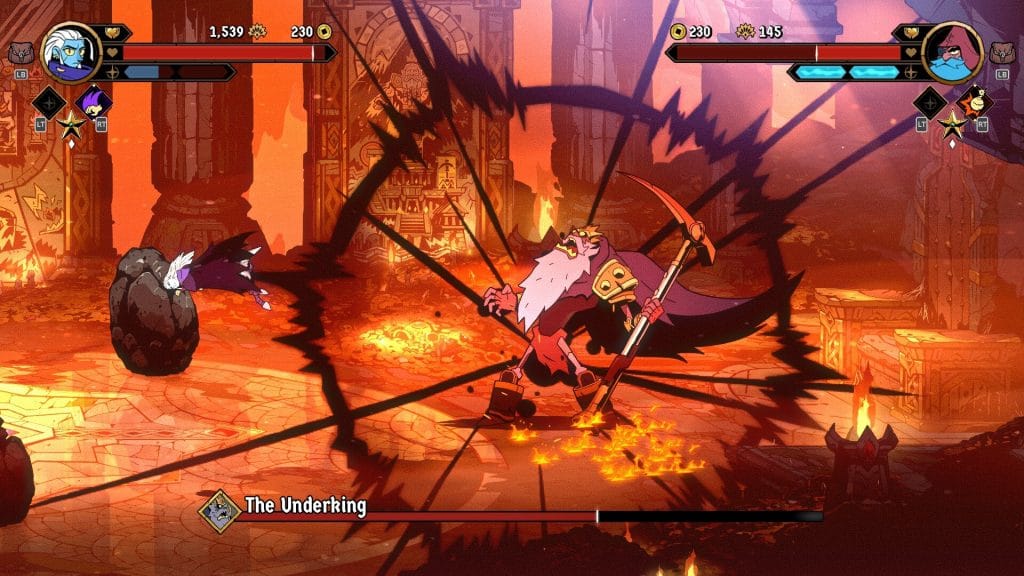
One Battle After Another
Adding to Absolum’s woes is its dated approach to progression. Like other roguelikes, you accrue currency you can then spend back at your hub in exchange for persistent upgrades, such as improved health or greater damage multipliers. Oddly, though, these upgrades feel less like “nice to haves” and more like “you won’t survive unless you max these out.”
Case in point: The final superboss (mild spoilers) automatically wipes your health bar before you fight it. This effectively means you cannot beat the full game unless you complete a run with at least two health bars in tact. From the game’s outset, you’re equipped with a revive that grants you 25% of your health upon death; through permanent upgrades, you can buy a second revive and boost each revive’s healing potency to 100%.
While you theoretically could beat the game without these upgrades, the average player will almost certainly invest hours into Absolum’s upgrade tree just to have a fighting chance. Skill only gets you so far; much of the game involves grinding run after run until you receive enough macguffins to “unlock” a fair shot at the end credits. You can call it a cynical take, but it’s what I experienced over the course of my 15- to 20-hour adventure.
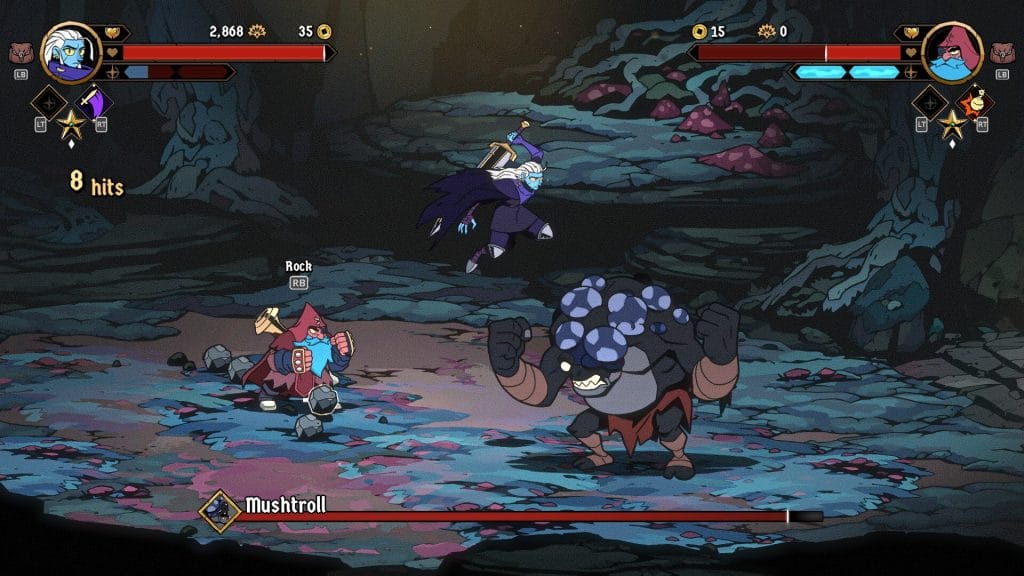
Finding the Flow (and the Fun)
It may sound like I soured greatly on Absolum by the time I wrapped up my playtime. Funny enough, I enjoyed almost every second of playing it. No, the roguelike structure doesn’t serve it well, and at times it feels like grinding is more important than actual strategy. But those are only small setbacks in the grand scheme of things. More often than not, you’ll be too busy enjoying the hell out of the actual gameplay to give a damn.
There’s a flow to combat that’s truly sublime. Every combat mechanic feels intricately layered, from dodges that lead into counterattacks, to the interplay between ground and air attacks, to the presence of various “Arcana” abilities that allow you to unleash devastating super moves. Before long, I was hacking up enemies, stringing up combos, and building up multipliers like it was second-nature.
I’ve already spoken about the game’s Streets of Rage influence, but there’s also a fair bit of Street Fighter embedded for good measure. As you wail on enemies, you’ll often force them into the corner of the screen, much like a traditional 2D fighting match. Here, you’ll drive up your combo and — with enough pressure — stagger the enemy for even greater punishment. It’s a wonderful blend of genres, and the perfect evolution of a combat system I already thought to be perfected in Streets of Rage 4.
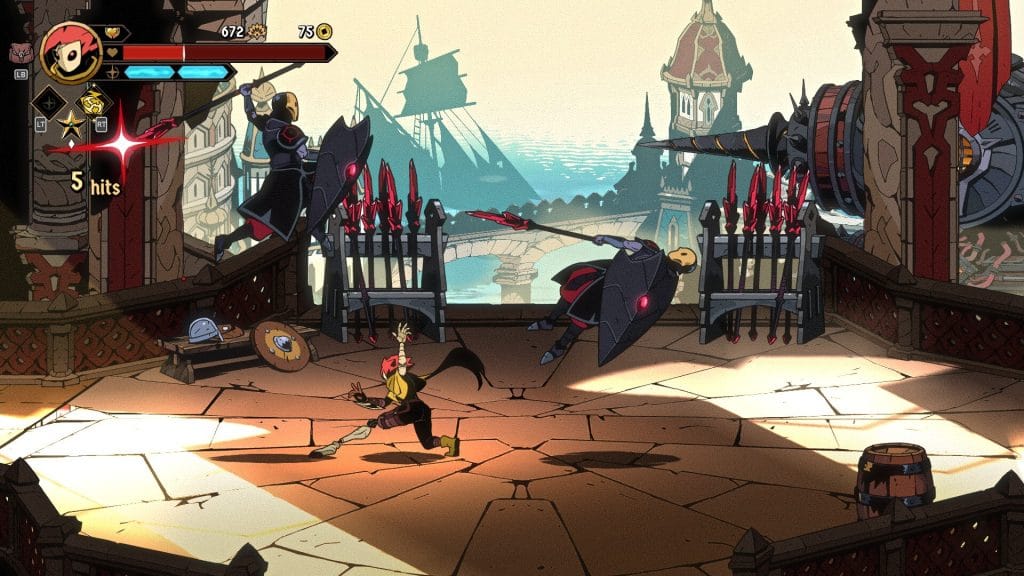
Walking in an Elvin Wonderland
If there’s one area where I have zero complaints about Absolum, it’s its wonderful audiovisual presentation. Stylistically, the game pulls from traditional comic books, complete with flashy effects and dramatic text boxes. Backgrounds look terrific, animations are crisp, and each of the four characters emanates style.
The soundtrack is even better. Composed by the ever-talented Gareth Coker (Ori and the Will of the Wisps, Halo Infinite), Absolum’s score is a gorgeous mix of delicate melodies and upbeat jams. Somber strings, pulse-pounding drums, hair-raising organs, and Coker’s trademark oboe all make an appearance, and the result is nothing short of pure magic. This is one I’ll be listening to for a long time.
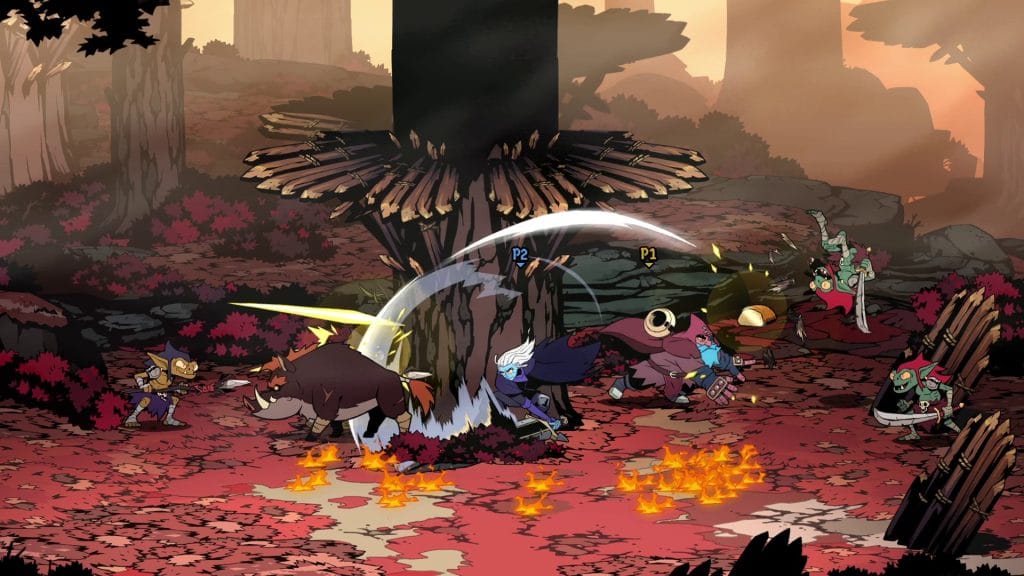
Final Thoughts
Absolum is one of the toughest games I’ve ever reviewed. Structurally, it’s a letdown, with disappointing balance choices, unrelenting RNG, and a progression system that feels half-baked in comparison with other contemporary roguelikes. Mechanically, however, it’s probably the strongest beat-em-up I’ve ever played.
The sublime combat ultimately wins out. Even when I was struggling to grind through runs, I was having a blast stringing up combos and laying waste to my enemies. If Dotemu ever decides to make a sequel, they could be on to something revolutionary. For now, Absolum will just have to settle as something great.
Score: 8.0/10
Absolum, developed by Dotemu, Guard Crush Games and Supamonks, and published by Dotemu and Gamirror Games, was released on October 9, 2025, for PC (via Steam), PlayStation 4 & 5, and Nintendo Switch. MSRP: $24.99. Version reviewed: PC (via Steam Deck).
Disclaimer: A review code was provided by the publisher.
David is the founder of The Punished Backlog. He has a problem finishing games he starts.
Just beat: Donkey Kong Bananza.
Working on: Hollow Knight: Silksong.
Can't wait for: Metroid Prime 4: Beyond.
Follow David on Twitter at @David_Silbert to keep up to date with all things The Punished Backlog.









4 Comments
I wanted to like this game coming off the back of hades 2 but I just couldn’t get into it sadly. Ended up switching to an indi metroidvania called ender lilies. Best indie game ever imho
Great review, thanks.
Axel’s plight in Streets of Rage 4? What are you talking about? SOR4 has fantastic gameplay but barely anything resembling a story. I’m enjoying Absolum because it feels like they took everything from the SOR expansion and moved it into a fun fantasy game where you actually have characters with some form of backstory
That’s a fair point. That said, my argument remains the same: I enjoyed the campy story in Streets of Rage 4 for what it was, and Absolum — though certainly more involved from a writing and lore perspective — didn’t exactly hit the same way for me.